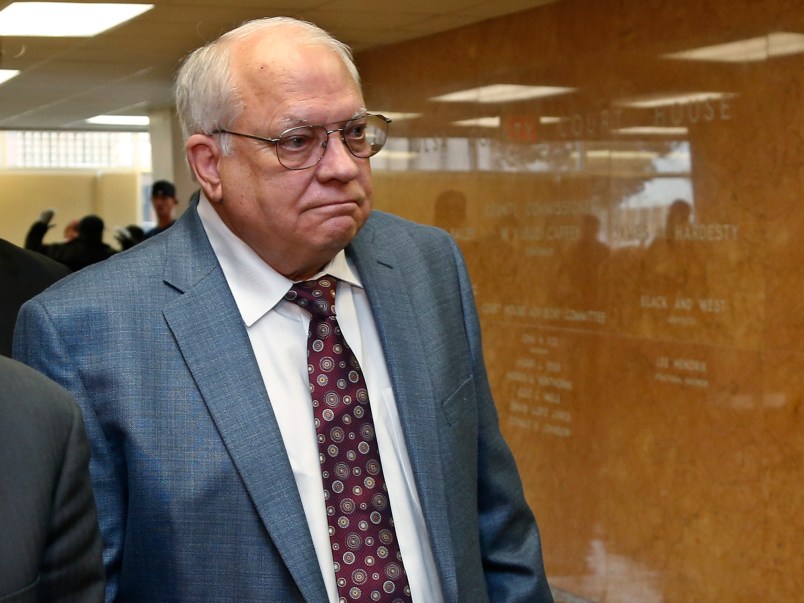TULSA, Okla. (AP) — A former Oklahoma volunteer sheriff’s deputy who said he mistook his handgun for his stun gun when he fatally shot an unarmed suspect last year was convicted of second-degree manslaughter on Wednesday.
Jurors handed down the verdict in the case of 74-year-old Robert Bates, a wealthy insurance executive accused of fatally shooting Eric Harris while working with Tulsa County sheriff’s deputies last year during an illegal gun sales sting. Harris, who had run from deputies, was restrained and unarmed when he was shot.
The shooting — which was caught on video — sparked several investigations that, among other things, revealed an internal 2009 memo questioning Bates’ qualifications as a volunteer deputy and showed that Bates, a close friend of the sheriff’s, had donated thousands of dollars in cash, vehicles and equipment to the agency.
The jury recommended a four-year prison term, the maximum, and Bates was handcuffed and taken into custody pending formal sentencing at a later date.
Bates’ defense attorneys argued at trial that methamphetamine found in Harris’ system, along with his cardiac health, caused his death. Defense attorneys called the killing an “excusable homicide.”
But prosecutors told jurors that Bates was guilty of culpable negligence when he shot Harris. One deputy testified that Bates apparently dozed off minutes before Harris fled from deputies.
Following the shooting, an outside consultant hired to review the sheriff’s office determined that it suffered from a “system-wide failure of leadership and supervision” and had been in a “perceptible decline” for more than a decade. The reserve deputy program was later suspended.
Weeks after Harris was killed, an internal sheriff’s office memo from 2009 was released by an attorney for Harris’ family that alleged superiors knew Bates didn’t have enough training but pressured others to look the other way because of his relationship with the sheriff and the agency.
A grand jury also investigated the agency and indicted the longtime sheriff, Stanley Glanz, in September, accusing him of failing to release the 2009 memo. He resigned on Nov. 1.
The new sheriff, who was sworn into office earlier this month, has detailed plans to reform and revive the reserve deputy program.
Copyright 2016 The Associated Press. All rights reserved. This material may not be published, broadcast, rewritten or redistributed.







Okay … He wanted to be a phony tough-guy cop and now he gets to experience both sides of law enforcement. Let’s see what happens first time he’s out in the prison yard.
I hope the judge follows the jury’s recommendation.
Hopefully he will soon join Bates behind bars. Since they will both probably be in some kind of protective custody unit, maybe they’ll end up being cell-mates.
Cue the first round of “appeals” accompanied by better judge and jury shopping.Next time, he’ll show up in a wheel chair, like Dennis Hastert. I hope he gets exactly the same amount of sympathy from the judge.
Never thought I’d see this.
They must have had to practice a lot to say that with a straight face.